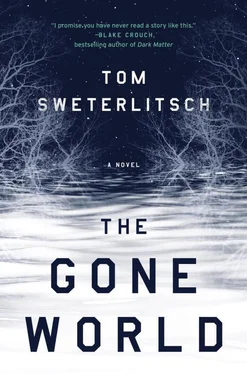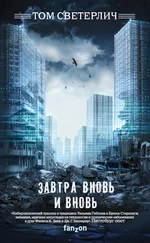Том Светерлич - The Gone World
Здесь есть возможность читать онлайн «Том Светерлич - The Gone World» весь текст электронной книги совершенно бесплатно (целиком полную версию без сокращений). В некоторых случаях можно слушать аудио, скачать через торрент в формате fb2 и присутствует краткое содержание. Город: New York, Год выпуска: 2018, ISBN: 2018, Издательство: G. P. Putnam's Sons, Жанр: Детективная фантастика, Триллер, на английском языке. Описание произведения, (предисловие) а так же отзывы посетителей доступны на портале библиотеки ЛибКат.
- Название:The Gone World
- Автор:
- Издательство:G. P. Putnam's Sons
- Жанр:
- Год:2018
- Город:New York
- ISBN:978-0-39916-750-8
- Рейтинг книги:5 / 5. Голосов: 1
-
Избранное:Добавить в избранное
- Отзывы:
-
Ваша оценка:
- 100
- 1
- 2
- 3
- 4
- 5
The Gone World: краткое содержание, описание и аннотация
Предлагаем к чтению аннотацию, описание, краткое содержание или предисловие (зависит от того, что написал сам автор книги «The Gone World»). Если вы не нашли необходимую информацию о книге — напишите в комментариях, мы постараемся отыскать её.
The Gone World — читать онлайн бесплатно полную книгу (весь текст) целиком
Ниже представлен текст книги, разбитый по страницам. Система сохранения места последней прочитанной страницы, позволяет с удобством читать онлайн бесплатно книгу «The Gone World», без необходимости каждый раз заново искать на чём Вы остановились. Поставьте закладку, и сможете в любой момент перейти на страницу, на которой закончили чтение.
Интервал:
Закладка:
“Hey, are you okay?” he asked. “You disappeared out here.”
“Collecting my thoughts,” she said. “You ever see anything like this before?”
Nestor’s forehead rippled as if the question had been a stone tossed into the lake of his thought. “That room reminded me of something my dad used to talk about,” said Nestor. “This recurring dream he called the ‘eternal forest.’ Come on, let’s get away from these statues—or whatever they are.”
They walked together along the path, through the shallow woods back toward Fleece’s house. “What dream?” she asked.
“We lived in Twilight, this little coal town. My dad worked the mines, always had dreams he was in the dark,” said Nestor. “So he wakes up in the night screaming—I hear him get up, and he comes into my room, sits on my bed, and looks at me. I was nine or something, just hoping he would think I was asleep, but he was drunk, and he says he was caught in a cave-in and he couldn’t get out through the mine, so he crawled deeper until the mine ended and he came out into a forest. He tells me about the trees like they were there in my room, like he could touch them.”
“The eternal forest,” said Moss.
“There are doors in the trees,” said Nestor. “And when he opened a door and stepped through, he stepped into a whole new forest. He said he was lost, and he asked me to find him. I told him I would and waited until whatever dream had a hold of him started to clear and he left my bedroom. He went to the bathroom, and I heard him back down the hall. I heard him start to snore and knew he was asleep. I never went back to sleep.”
“You were nine?” asked Moss, imagining the child, imagining his father.
“Sometimes he talked about this dream like it was a place you could go to, like it wasn’t a dream at all, so when I saw those mirrors…”
She wanted to unburden herself, but she said, “Don’t think about Fleece’s bullshit. You don’t want this in your head.”
She steeled herself before reentering the house. Even though the immediate sources of putrefaction had been removed, the other odors remained: the fur walls, the festering garbage bins. The techs had pulled cardboard boxes from Fleece’s front closet. Moss wore latex gloves, picked through the contents. She found an album of yellowed photographs, of Vietnam—pictures of PBRs, the four-man river patrol boats called swift boats. Mekong and Rung Sat , labels in blue ballpoint . Navy, in Vietnam—a connection to Mursult, she thought. She wondered if Mursult and Fleece had served together. Matchboxes filled with dead spiders, beetles, one of the other techs discovered a pillowcase stuffed with dead birds. Filth , she thought. His “art” covered the walls, not only the large mural made of animal hides but framed pictures, photographs he had doctored. Two hung in the bathroom. A still image from the Zapruder film, the moment Kennedy was struck by the second bullet, his face fleshy pink and opened outward, like his face was a door with a hinge. Fleece had painted a halo around Kennedy, oxidized brownish blood radiating from the president’s head. In the other picture, he’d painted seven halos over a photograph of the Challenger —the explosion puff a burst of cloud and shuttle pieces in curlicues of smoke, odd trajectories.
“We found something,” said Nestor. “Over here.”
Nestor had been working in the smaller of the two bedrooms, a relatively clean room—the mattress on the floor had been made, the sheets and comforter tucked tightly at the corners. The largest of Fleece’s doctored photographs hung here—she recognized an enlarged photograph of Fleece’s Vietnam swift boat, but it had been coated with crescent-shaped nail clippings and the nails and claws of animals. A plumb line of sorrow dropped through her—she thought of the fingers of the Mursult family, their fingernails removed. The picture was labeled, This is the Ship of Nails that will Carry the Bodies of the Dead.
“We’re figuring Mursult stayed here,” said Nestor. “That this is his stuff.”
The contents of a black duffel bag were spread out across the mattress. A few thousand dollars in stacks of twenties, clothes, toiletries, a pager. Twenty-four Polaroids were laid out in a grid—graphic in their portrayal of a woman. A black woman, thin. Her face was never shown. Her breasts were beautiful, thought Moss, her belly taut—Moss studied the smooth, dark lines of the woman’s thighs, the images of her genitals, how she spread herself pink. Intimate rather than pornographic—pictures no one other than the photographer and the subject were ever meant to see. They had been taken in a cabin, it looked like, not here. A rental cabin, maybe. The walls were exposed lumber, a glimpse of a bedside table, a pad of paper, a phone.
“Can you ID the woman?” she asked.
“No.”
“What makes you think Mursult?” she asked.
“The first few numbers we recovered from the pager are Mursult’s home phone number,” said Nestor. “I’m thinking he called himself a couple of times, made sure the pager was working.”
They stepped outside. Nestor was staying to oversee the evidence collection, but he made an arrangement with one of the sheriff’s deputies to ride Moss back to Canonsburg. Late afternoon, the day bleeding away from them.
“Did you catch the picture of the boat?” asked Moss.
“The fingernails? Yeah,” said Nestor. “We’ll have our guys test the fingernails, see if any of them are from the Mursult family—it will take a while. I don’t see this guy Fleece being able to kill three people without using a gun, though, do you? Out of shape—he didn’t look like he could have caught them or defend himself if any of them fought back. The wife, Damaris Mursult, was athletic. The son—”
“I’ll bet the autopsy says he’s been dead too long to be our guy anyway,” said Moss.
“What was that he wrote on the picture? A ship of nails?”
“A ship of nails to carry the dead,” said Moss. “I don’t know. Jesus Christ, we’ve seen a lot of death today.”
“Are you religious?” asked Nestor.
“What?” she said—she realized she’d blasphemed, was worried she might have offended him. Several men she’d met in law enforcement were Christians, evangelicals. “I’m sorry, I—”
“My faith is the only thing that sustains me,” said Nestor. “Thinking about the boy and girl, thinking about Marian. It breaks me, but I believe in eternal life, I think of how God will care for these victims, and it helps me—it helps me stay focused. I imagine a new life for them. Do you believe in the resurrection of the body?”
Moss thought of all of humanity in a funnel leading to a singular point.
“No,” she said.
THREE
Her mother still lived in Canonsburg, in the same house Moss had grown up in, a little blue house on the steep hills northeast of East Pike, just a few blocks up from the Sarris candy factory. Her childhood had been scented with chocolate. Moss popped two wheels onto the sidewalk whenever she parked, angling the wheels, setting the brake. She made her way along the weedy path to the side door and unlocked the dead bolt with the same key she’d used since middle school.
“Mom?” she said.
“Up here,” said her mother.
Surprised to find her mother home, figuring she might be at McGrogan’s—almost every night after her shift at the call center, her mother changed into stone-washed jeans and a tight top and rambled downhill to the bar, walking so she wouldn’t have to worry about driving home. Everyone knew her mother to see her, she was always ambling about the neighborhood to find cigarettes, to find a drink, a forty-four-year-old often lit after last call, bumming in empty lots with other barflies too stoned to want to go home. A character, a regular. McGrogan’s was an off-and-on bar, some nights quiet with nothing to do but watch the news on the TVs and chat up the bartenders, other nights so full you had to shuffle sideways just to get to the bathrooms. Her mother had her usual stool, at the corner of the bar where she could relax with her back to the wall and see what developed. Her hands were rippled with veins, and her natural hair had dulled to the color of wheat bread, but she could still turn heads if she wore the right outfit and the lights were dim. Moss looked at her mother and saw herself in a few years. The irony of traveling to IFTs was that Moss’s body aged in these futures even if the terra firma of the present had seemed to pause, waiting for her. Chronologically, Moss was only twenty-seven, born in 1970 when her mother was seventeen. Biologically, though, Moss was almost forty, just a few years shy of her mother. Moss and her mother never mentioned their ages to each other, however, even though Moss was certain her mother must have noticed the contracting gap between them—a sibling more than a daughter, a weirdness too disturbing to discuss or even acknowledge. No intimacy had ever developed between them, though, no sense of equal footing—their experiences too divergent, their lives lived in such different places. Moss was taller, toned, serious, while her mother was brassy—people invariably figured they were sisters the rare times they went drinking together.
Читать дальшеИнтервал:
Закладка:
Похожие книги на «The Gone World»
Представляем Вашему вниманию похожие книги на «The Gone World» списком для выбора. Мы отобрали схожую по названию и смыслу литературу в надежде предоставить читателям больше вариантов отыскать новые, интересные, ещё непрочитанные произведения.
Обсуждение, отзывы о книге «The Gone World» и просто собственные мнения читателей. Оставьте ваши комментарии, напишите, что Вы думаете о произведении, его смысле или главных героях. Укажите что конкретно понравилось, а что нет, и почему Вы так считаете.




![Том Светерлич - Завтра вновь и вновь [litres]](/books/401288/tom-sveterlich-zavtra-vnov-i-vnov-litres-thumb.webp)
![Том Светерлич - Исчезнувший мир [litres]](/books/420722/tom-sveterlich-ischeznuvshij-mir-litres-thumb.webp)






